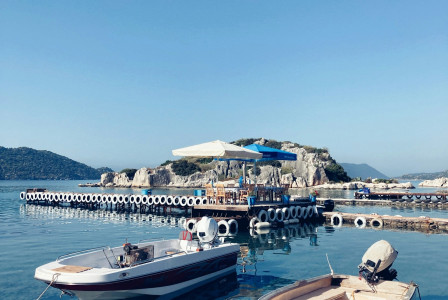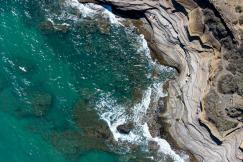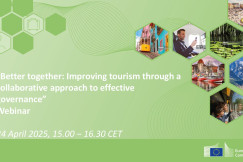News
22 September 2025
Mapping the impact of Blue Tourism in the Mediterranean
News
22 September 2025
Coastal, maritime and inland water tourism
Best practices, peer learning and networking
Governance of tourism destinations
+27 more
Login / create an account to be able to react
-
17

A recent report, Mapping the Impact of Blue Tourism in the Mediterranean: Vulnerability Assessment of Coastal and Marine Ecosystems, was developed by the European Topic Centre for Spatial Analysis and Synthesis (ETC-UMA, University of Malaga) for the IUCN Centre for Mediterranean Cooperation (IUCN-Med). It highlights the environmental pressures of coastal and marine tourism in the region and provides recommendations for more sustainable management. The study was co-funded by the French Global Environment Facility (FFEM) and the France–IUCN Partnership. You can access the complete publication here: Blue Tourism Initiative.
Blue Tourism
Blue Tourism
Topics
Albania
Croatia
France
Greece
Italy
Spain
Academic / Research and VET Institutions
Destination Management & Marketing Organisations
-
Specific types of tourism
-
-
Coastal, maritime and inland water tourism
-
-
Transition Pathway Strategic Areas
-
-
Best practices, peer learning and networking
-
Governance of tourism destinations
-
Tourism strategies
-
-
Business activities
-
-
Activities of amusement parks and theme parks
-
Activities of associations and other organisations supporting tourism
-
Air passenger transport
-
Camping grounds, recreational vehicle parks and trailer parks
-
Events catering and other food services
-
Festivals, cultural and entertainment activities
-
Gardens and nature reserves activities
-
Holiday Housing / Apartments and other short stay accommodation
-
Hotel and similar accommodation
-
Mobile beverage services
-
Mobile food services
-
Museums
-
Operation of historical sites
-
Other
-
Other accommodation
-
Other amusement and recreation activities
-
Other food and beverage services
-
Other holiday reservation services
-
Other tourism transportation activities
-
Rail Passenger transport
-
Recreational and sport activities
-
Restaurants, cafes and bars (Food and Beverage serving activities)
-
Road passenger transport
-
Tour operator activities
-
Travel agency activities
-
Water (sea, coastal and inland) passenger transport
-
Share
The Mediterranean is one of the world’s leading tourism destinations, attracting millions of visitors each year. While tourism provides economic benefits and supports local communities, it also creates significant pressures on fragile marine and coastal ecosystems. The new vulnerability assessment prepared under the Blue Tourism Initiative explores these dynamics in detail.
The report maps tourism-related pressures such as leisure boat activity, cruise traffic, coastal urbanisation and golf tourism, and overlays them with areas of high biodiversity value. The analysis identifies hotspots where ecologically sensitive habitats, such as Posidonia oceanica seagrass meadows or areas important for cetaceans, are exposed to high levels of tourism activity.
Key findings underline that some regions face “cumulative tourism pressures” where both land- and sea-based activities coincide with insufficient protection measures. This creates particular risks for biodiversity, local resilience and long-term sustainability of the tourism sector itself. The assessment also draws attention to regional differences. While EU countries often face pressure despite relatively large protected networks, in non-EU Mediterranean countries, the vulnerability is mainly due to the lack of adequate protection.
The study provides recommendations for policymakers and tourism stakeholders, including improving conservation of sensitive areas, reducing pressures from leisure boat anchoring, and implementing measures against vessel collisions with marine mammals. It also stresses the importance of harmonised tourism data across the region to enable evidence-based decision-making.
The publication forms part of the wider Blue Tourism Initiative (2023–2026), a multi-stakeholder programme implemented by IUCN-Med, IDDRI, eco-union and partners in the Mediterranean, Caribbean and Western Indian Ocean. It aims to scale up sustainable blue tourism by connecting science, policy and practice.
For a more detailed look at the methodology, maps, and recommendations, the full report is available here: Blue Tourism Initiative.
#Report #Sustainable tourism #Destination Management
Comments (0)
Related content
See also
Master tourism with data: Insights from Tour Tech podcast
- Categories
- Coastal, maritime and inland water tourism Cultural tourism Ecotourism +42 more
Sign-up for the Sustainable EU Tourism Twinning Workshop
- Categories
- Coastal, maritime and inland water tourism Cultural tourism Ecotourism +64 more
Upcoming Webinar 24 April 2025 "Better together: Improving tourism through a collaborative approach to effective governance"
- Categories
- Coastal, maritime and inland water tourism Cultural tourism Ecotourism +46 more






